E-novine: Ubice Srebreničana šetaju Beogradom
Sorry, this entry is only available in srpski.

Sorry, this entry is only available in srpski.
Sorry, this entry is only available in srpski.

 To the Serbian Office of the Prosecutor for War Crimes, the Humanitarian Law Center (HLC) filed charges against more than 50 members of the Ministry of the Interior of the Republic of Serbia (MUP), the Serbian State Security (DB), and the Yugoslav Army (VJ) for the war crimes against the prisoners of war. The crimes were committed in the period between end of July 1995 and April 10, 1996 against more than 850 Muslims from Zepa and the surrounding villages in Bosnia and Herzegovina, in POW camps of the Republic of Serbia Sljivovica (Cajetina Municipality) and Mitrovo Polje (Aleksandrovac Municipality).
To the Serbian Office of the Prosecutor for War Crimes, the Humanitarian Law Center (HLC) filed charges against more than 50 members of the Ministry of the Interior of the Republic of Serbia (MUP), the Serbian State Security (DB), and the Yugoslav Army (VJ) for the war crimes against the prisoners of war. The crimes were committed in the period between end of July 1995 and April 10, 1996 against more than 850 Muslims from Zepa and the surrounding villages in Bosnia and Herzegovina, in POW camps of the Republic of Serbia Sljivovica (Cajetina Municipality) and Mitrovo Polje (Aleksandrovac Municipality).
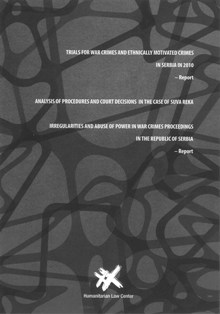 In its first part, the report discusses war crimes trials conducted before courts in Serbia starting with a short presentation of general characteristics of these proceedings. This is followed by the overview of the trials in which the Humanitarian Law Center represented victims and it contains the analysis of the proceedings in each individual case. The following part of the report contains an overview of the trials in which the HLC monitored the main hearing. There is a special text in the report, which contains an analysis of the proceedings and court decisions in Case Suva Reka. The last part of the report deals with the irregularities in the prosecution of war crimes in Serbia, i.e. with problems of the witnesses and the threats to their personal security in the case of members of the 37th Special Police Units Detachment, who have been indicted for war crimes committed in Kosovo during 1998 and 1999.
In its first part, the report discusses war crimes trials conducted before courts in Serbia starting with a short presentation of general characteristics of these proceedings. This is followed by the overview of the trials in which the Humanitarian Law Center represented victims and it contains the analysis of the proceedings in each individual case. The following part of the report contains an overview of the trials in which the HLC monitored the main hearing. There is a special text in the report, which contains an analysis of the proceedings and court decisions in Case Suva Reka. The last part of the report deals with the irregularities in the prosecution of war crimes in Serbia, i.e. with problems of the witnesses and the threats to their personal security in the case of members of the 37th Special Police Units Detachment, who have been indicted for war crimes committed in Kosovo during 1998 and 1999.
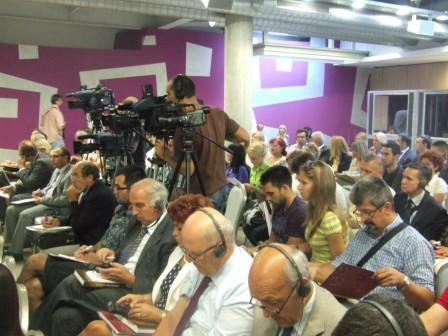
BELGRADE, September 16th, 2011- Among the topics of the Conference on Domestic War Crimes Trials were regional cooperation and challenges imposed by the closing down of ICTY, and a special part of the conference was dedicated to witnesses associates and their protection, since there have been serious omissions in this segment of war crimes trials.
 LONDON, 15th September 2011, the British Academy – States have a clear but largely unmet responsibility for full and transparent reporting of those killed in armed violence around the world. This is the central message of a new initiative, the Charter for the Recognition of Every Casualty of Armed Violence, launched Thursday, 15 September, at the British Academy and already endorsed by 37 humanitarian and human rights organisations from around the world.
LONDON, 15th September 2011, the British Academy – States have a clear but largely unmet responsibility for full and transparent reporting of those killed in armed violence around the world. This is the central message of a new initiative, the Charter for the Recognition of Every Casualty of Armed Violence, launched Thursday, 15 September, at the British Academy and already endorsed by 37 humanitarian and human rights organisations from around the world.
Sorry, this entry is only available in srpski.
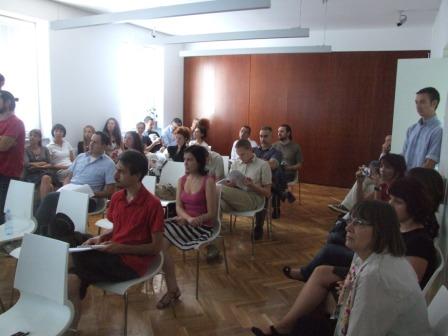
Belgrade, September 14, 2011 – Nataša Kandić, Director of the Humanitarian Law Center (HLC) stated today that there is still no official action of the authorities in charge following the criminal complaint filed by the HLC against commanders and members of the Tenth Sabotage Detachment of the Army of Republika Srpska (the Detachment) for the crime of genocide they committed in Srebrenica in spite of all available evidence.
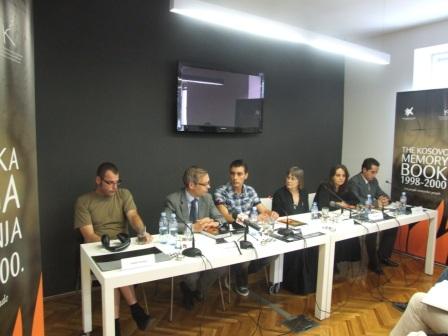 BELGRADE, 09/08/2011 – Today, September 8, 2011, on the premises of the Humanitarian Law Center (HLC), the first volume of the Kosovo Memory Book: 1998 was promoted. The book deals with human losses in Kosovo in 1998. The follwoing speakers took part in the promotion: Mr. Nils Ragnar Kamsvag, Norwegian Ambassador; Natasa Kandic, Director of HLC; Bekim Blakaj, Director of HLC-Kosovo, Olgica Bozanic from the Associations of Families of Victims and Missing Persons; Slobodan Kostic, journalist; and Vladimir Arsenijevic, writer. The presentation was attended by family members of victims and missing persons, NGO representatives, representatives of the diplomatic corps in Serbia, as well as judges and prosecutors. None of the politicians or senior government officials attended the event.
BELGRADE, 09/08/2011 – Today, September 8, 2011, on the premises of the Humanitarian Law Center (HLC), the first volume of the Kosovo Memory Book: 1998 was promoted. The book deals with human losses in Kosovo in 1998. The follwoing speakers took part in the promotion: Mr. Nils Ragnar Kamsvag, Norwegian Ambassador; Natasa Kandic, Director of HLC; Bekim Blakaj, Director of HLC-Kosovo, Olgica Bozanic from the Associations of Families of Victims and Missing Persons; Slobodan Kostic, journalist; and Vladimir Arsenijevic, writer. The presentation was attended by family members of victims and missing persons, NGO representatives, representatives of the diplomatic corps in Serbia, as well as judges and prosecutors. None of the politicians or senior government officials attended the event.
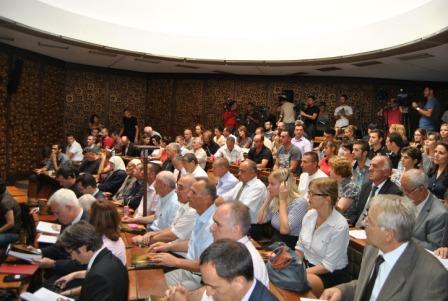
Humanitarian Law Center and Humanitarian Law Center Kosovo organized promotion of Kosovo Memory Book, 1998 that is composed by 2.046 narratives of killed, fallen and missing persons during the war in Kosovo in 1998. According to Natasa Kandic from humanitarian Law Center this book is very important because it describes the context of how thousands of people were killed in Kosovo. “For the first time in the history of Balkans we have a book that tells stories of victims and will serve for the future generations to refer to this book while they speak about that what happened in the past” and added that “this book does not intend to equalize victims but to show the societies in Serbia and Kosovo what happened during this period”. Bekim Blakaj from Humanitarian Law Center Kosovo spoke about the engagement of tens of person in collecting data and that more than 8.400 interviews are done with victim’s family members.